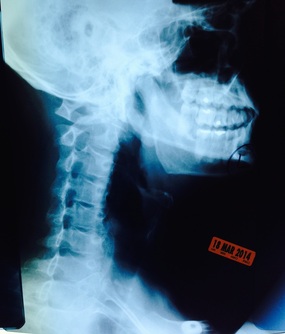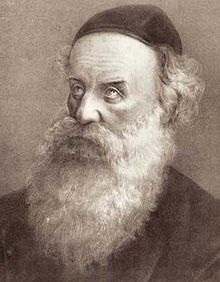 An icy day at Walden Pond
An icy day at Walden Pond Walden Pond, of course, is the place where Henry David Thoreau built a 10' x 15' cabin and spent two years, from 1845 to 1847, living a simple life. He recorded his experience in his book, Walden: or, Life in the Woods, a classic of American literature and philosophy. At the site of the cabin today, there is a plaque with Thoreau's words: "I went to the woods because I wished to live deliberately, to front only the essential facts of life and see if I could not learn what it had to teach, and not, when I came to die, discover that I had not lived."
That sentiment is resonating with me this week as I think about Tazria, this week's very challenging Torah portion. The portion deals with the ritual impurity of women who have given birth and with the strange laws regarding a skin disease called tzara'at in the text (and often mistakenly translated as "leprosy"). As Torah portions go, there are few that are more deeply moored in the "essential facts of life" – childbirth, disease and the specter of death.
One of the most mystifying aspects of this Torah portion is the declaration that the ritual impurity of giving birth to a male child lasts 33 days, but the impurity following the birth of a female child lasts twice as long, 66 days. The text itself offers no explanation for the discrepancy. It is left as a mystery.
I have written about this subject before, offering my own understanding of the ritual impurity that follows a woman giving birth. Some readers, while appreciating the interpretation, have wondered why a contemporary Jew would even bother to find meaning in a passage from the Torah that seems so blatantly misogynistic, so obviously disrespectful of women. I have been asked, "At what point does looking for spiritual meaning turn into justification for something that simply is wrong?"
It is a good question, one that I take seriously. There are things in the Torah – slavery, killing, racism and sexism – that cannot just be "drashed away." I believe that we do need to confront those texts and be willing to say that those ancient writings do not always represent the values we cherish and by which we wish to live.
However, I also will say that Torah's gifts do not always lie upon the easy surface. Even the texts that are most difficult for us can open our eyes to moments of wonder. I had one of those today.
The path around Walden Pond was not really made for hikers at this time of year, especially after the snowy winter that New England has had. The ground was covered with ice and my daughter and I had to struggle just to keep on our feet. We went through long stretches of slow careful slipping and sliding along the ice, but my little girl is more hardy and persistent than she looks. She did marvelously.
At one point, I asked her to take the lead, so I could keep an eye on her and to encourage her to keep up a good pace. She surprised me with her determination to be a good leader. When I tried to pass her, she shouted, "You told me to take the lead!" I had to defer to her and let her lead on.
I only have girls. I often have wondered what it would be like to have a son – a child who, like me as a child, would be more excited by sports than by dolls, more motivated by competition than by relationship-building. My girls sometimes seem like a mystery to me, but they also surprise me in moments like this when – in their own decidedly female way – they can be every bit as tough and determined as any boy.
I will not say that the Torah is not patriarchal and that it does not have passages that are misogynistic. But, I will say that the Torah speaks a truth when it notices that boys and girls are not the same. The Torah teaches something of value in reminding us that there is a mystery beyond our ken in the way that gender forms us. A little girl can be such a surprising and awe-inspiring creature, even to a man who has known her since the moment she was miraculously born.
It is a secret held in the woods and in "the essential facts of life." Today, it was a moment in which I felt that the world had something to teach me.
Other Posts on This Topic:
Tazria: Newborn Spirituality
Pinchas: Five Sisters Who Turned the Key to Unlock the Torah




 RSS Feed
RSS Feed
